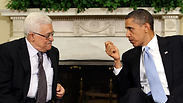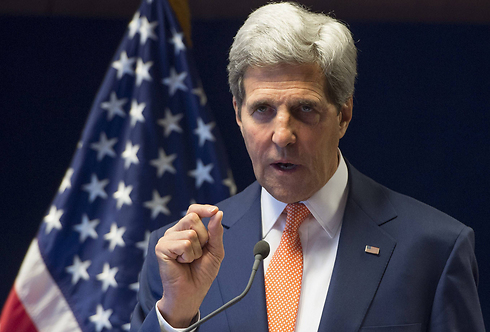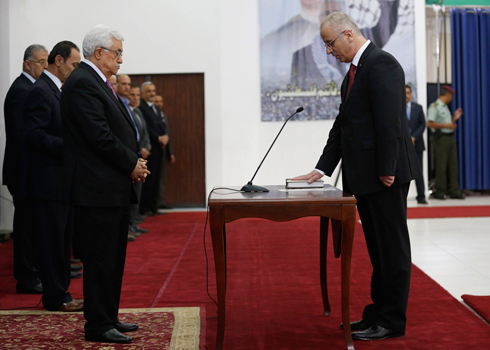
Palestinian aide: 'Int'l community must tell Israel enough is enough'
In interview, senior Abbas aide says 'there’s no way that countries that respect democracy will deny the Palestinian democracy', speaks of possible change of US stance towards Palestinians, against Israel.
Ramallah– Dr. Sabri Saidam, Adviser to Palestinian Authority President Mahmoud Abbas for Telecommunications, Information Technology and Technical Education, is the Deputy Secretary-General of the Fatah Revolutionary Council and former Minister of Telecom & IT.
He was interviewed in Ramallah by The Media Line’s Abdullah H. Erakat one day after the swearing-in of the Palestinian unity government.
TML: Dr. Saidam, what is your reaction to the formation of a Palestinian unity government?
Saidam: This is certainly a step in the right direction. It’s a restoration of the fabric of the Palestinian society in terms of a political system and in terms of its social layers and in terms of restoring the very picture that portray Palestinians as people who respect democracy and want the international community to acknowledge and respect such democracy.
TML: How did Fatah manage to finally agree on unity with the rival with whom it has been odds with for seven years?
Saidam: We had internal talks in Fatah about this move prior to the Gaza agreement which appears to the public as if it happened at the ‘press of a button.’ Things were happening; discussions were underway; and preparations were taking place before the announcement which led to the recognition of the need to end the Palestinian divide by taking the extra steps needed to restore the relationship with Hamas.
This was a bilateral move – Hamas also came to its senses internally for the need of achieving unity. So this has been a coordinated effort between the two parties in order to achieve Palestinian unity.
TML: The Palestinian public is skeptical about this unity deal being for them. Some believe Hamas did this because they saw the Muslim Brotherhood fall from grace in Egypt and Fatah did this because the negotiations with Israel crashed.
How do you address those who say this deal is intended for the benefit of Fatah and Hamas rather than for the people?
Saidam: The public is right in its assessment about the reconciliation. Some will perceive it as a ‘marriage of convenience.’ Let it be. I think Palestinian unity is the way to end occupation and a way of achieving a consensus should there be a peace agreement with Israel.
Abu Mazen (nickname for Palestinian Authority President Mahmoud Abbas) will no longer be representing (only) the West Bank, but will be representing the whole of the Palestinians. Even if Hamas joins ranks and votes against referendum, it will still be playing a part of a partner rather than that of a spoiler.
TML: The response from Israel has been anything but kind; there have been threats about sanctions. What are your thoughts considering that Israel’s strongest ally, the United States, has said that it would recognize this government?
Saidam: I would have been shocked if the response of Israel was not of this nature. Israel is occupying the Palestinians and is interested in the ‘divide-and-rule’ basis of relationship that it wants to establish with the Palestinians. So I am not surprised at all. This formula of reconciliation, it’s not what Israel says, it’s what America and the international community are saying.
Now, we have to restrain Israeli lobbyists and the Jewish Diaspora from lobbying against reconciliation. The international community realizes that was part of the process that led to Hamas victory in the 2006 elections and that it is better to acknowledge the results (of reconciliation), and sees the benefit of achieving Palestinian unity.
Israel is occupying the Palestinians and not the other way around and that means in international law terms, there are obligations on the occupier and the obligations will require that Israel gives way to the new ministers of the new government and should allow Palestinian politics to prevail and take part in an engagement that will lead definitely to a peaceful formula which is for the benefit of the Israelis.
The current government does not see it this way. The current Israeli government is only interested in consolidating occupation; it has no interest in ending this saga, the longest occupation in modern times. So I hope this interview will basically lay the foundations for Israelis around the world, for moderate Jews around the world, to see the benefits of including every walk of life under the umbrella of the PLO and have the Palestinians speak in one voice.
TML: The US State department said it would recognize and deal with this new Palestinian government. Earlier, the US Secretary of State had said it would not rush to acknowledge it. Were you surprised at the speed with which the Americans said “yes” to the unity government?
Saidam: Not at all. I think that Senator Kerry had repeatedly mentioned the importance of the mandate of the new government. President Abbas, immediately after the swearing-in ceremony, went on-air to address the international community and the Palestinians to reaffirm the commitment to the two-state solution; the belief in the Quartet’s principles; and committing to ending conflict.
That’s exactly what the American administration wanted to hear and that’s exactly what the international community wanted to hear.
There’s no way that countries that respect democracy will deny the Palestinian democracy and turn their backs on the restoring of Palestinian unity. What the Israeli government refuses to accept is that unity is good for peace. Rather, it is spending day in and day out trying to project and magnify the inclusion of Hamas as something bad for the peace process and bad for the Middle East. (Israel is) totally wrong.

TML: You say that, but Israel says Abbas has chosen peace with Hamas over peace with Israel or peace in the Middle East.
Saidam: Where is the peace Israel tells us about? I’ve heard repeatedly statements saying that Abbas is weak, he does not represent the whole of the Palestinians. And surprisingly enough, unity was achieved and Abbas became the man that represents the whole of the Palestinian people. Israel came back and said Abbas has to choose between Hamas and peace.
What is peace? Where is peace? If anything, Israel has been interested in the piece of land that’s called Palestine in order to break it apart; to build more settlements; to build its apartheid wall; and to increase the number of checkpoints. So, for Palestinians, it was nothing but a joke. Where is the peace that Israel has been telling the international community it has offered Abbas?
TML: The United States has asked for an investigation into the shooting of the two Palestinian teens in Ramallah on May 15th. Some analysts suggest that America’s language has never been stronger towards the Palestinians and against Israel. Is the US line changing and is Israel isolating itself?
Saidam: The term isolation came about with John Kerry. We owe it to him that he has used that term. And he had said it before the shooting of Nadeem Nuwara and Mohammad Abu Dahher. And then came Martin Indyk with his statement. I think the American administration with big support from the Jewish Diaspora is seeing that there has to be an end to this.
The occupation is unsustainable. It is unjustified and has gone way beyond expectations. It is hard to be celebrating democracy in Arab capitals and denying the Palestinians the very right of co-existence and access to democracy and liberty. I think the issue at hand is that this occupation is totally unjustified, really unsustainable, and totally unexplained to the world. Nobody can see why Israel would see an inch of land as more important than coexistence.
TML: Not everyone in Washington is okay with the acceptance of this government by the United States government.
Saidam: It’s not an easy ride. It’s definitely a rough ride. A lot of elements will be pressing the Obama administration to cut down aid, to curb Palestinian unity and withdraw its support for this government. That is totally expected. What needs to be done – and I would say that the onus is on us now – is to advocate unity as something good and couple that with deeds that speak louder than words.
I hope that this government will work towards fulfilling the PLO’s message and vision for the future and consolidate steps that are to be seen by the international community as steps toward restoring and upholding nothing but peace.
TML: I want to go back to the mandate of this government. It is claimed that it is a government of technocrats. No Fatah and no Hamas. If that is the case, then where is the unity?
Saidam: Unity is achieved by compromise. And compromise was to withdraw any elements that are going to cause any friction. Political allegiance has defaced the relationship over the last few years and the two parties have resolved that if political affiliation would mean friction in the future, we might as well withdraw it.
At the end of the day, this government is a transitional government, should lay the foundations for Palestinian elections, and with these elections, the international community would see firsthand that the Palestinians are not for throwing Israel into the sea, but rather for creating Palestine. It’s not about killing Israel; it’s about bringing birth to Palestine. That’s the very message that has prevailed over the last two years when we were planning to go to the United Nations. It’s time for the occupation to end. That’s a reality.
TML: Israel prevented four Palestinian ministers from Gaza from joining their own swearing-in ceremony. Do you think President Abbas has other challenges coming?
Saidam: Israel is very wrong. I think it will be told this not only by the Palestinians but by the international community. Israel is trying to stop Palestinian democracy by banning ministers from coming. Israel is exercising yet another element of oppression against Palestinian democracy and human rights and against the liberty of Palestinians.
I hope Israel will come to its senses and realize what it is doing is wrong. Israel claims that Hamas is extremist. I’m not the spokesperson for Hamas. Hamas has the right to explain and defend itself. The Israeli government has elements and parties who said that God made a mistake by creating Arabs. You can’t be more extreme. Yet they are part of the government. (Yet,) Israel is asking us to recognize them, denying ourselves the right of having other parties with different views about different matters.
What matters most now is the vision of the president, the vision of the PLO, the two-state solution, and previously signed agreements – the Quartet’s principles – and the end to conflict. What’s most important is Israel and Palestine living side by side; nobody eliminating the other and nobody stepping on the history of the other, but rather living in co-existence. Beyond that, I can see hell breaking loose or I can see more Palestinians coming forward toward a one-state solution.
TML: Israel is threatening to cut off ties with the Palestinian Authority. Are you prepared to handle this?
Saidam: The time has come for the international community and not the Palestinians to say enough is enough. Israel is playing with fire. Israel is wasting the time of humanity by prevailing and prolonging this occupation.
Article written by Abdullah H. Erakat
Reprinted with permission from The Media Line











